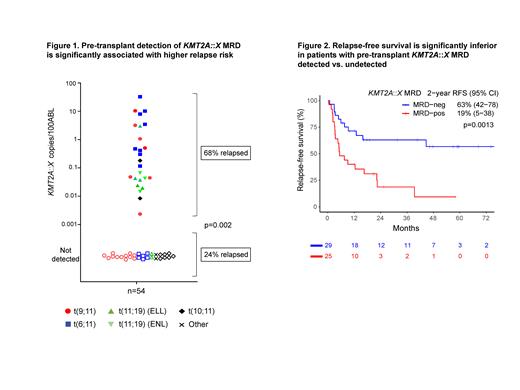Introduction
KMT2A-rearranged ( KMT2Ar ) acute myeloid leukemia (AML) is associated with inferior survival and allogeneic hematopoietic cell transplant (HCT) in first remission (CR1) is an important post-remission objective (Issa et al, Blood Cancer Journal 2021). Despite HCT, however, the relapse risk is ~50% (Menghrajani et al, Blood Adv. 2022). Several small cohort studies have described the prognostic utility of pre-HCT MRD assessment using real-time reverse transcription quantitative polymerase chain reaction (RT-qPCR), but currently, this is not standard practice (Scholl et al, Haematologica 2005; Huang et al, Med Sci Monitor 2016; Liu et al, Biol Blood Marrow Transplant 2014; Heuser et al, Blood 2021). A significant barrier to widespread implementation of KMT2A::X MRD monitoring is the presence of diverse fusion-partner genes and varied breakpoint regions. The potential to detect and pre-emptively target pre-HCT KMT2A::X MRD has relevance with the development of menin inhibitors, which have been shown to be active in the clinic (Issa et al, Nature 2023). In the current work, we report the prognostic impact of pre-HCT KMT2A::X MRD detection by RT-qPCR and the relationship with post-HCT outcome in adults with KMT2Ar AML. We also describe a novel 3 common primer/probe KMT2A::X reverse transcription digital PCR (RT-dPCR) MRD assay as a simplified dPCR alternative to MRD monitoring.
Methods
Archived pre-HCT cDNA were available from 54 patients treated in the UK (including UK NCRI AML17 and AML19) and Australia. Samples were analyzed by RT-qPCR using previously described methods in 45 patients (Abildgaard et al, Eur J Haematol. 2013), and RT-dPCR in 9 patients (Ivey, unpublished 2023). The RT-dPCR method, which uses a common 3 primer/probe set to capture breakpoints within KMT2A obviating the need for fusion-gene specific plasmid standards, showed high concordance with RT-qPCR across 20 samples (R 2=0.9915) . Copy numbers were expressed per 100 ABL copies. Assay sensitivity was ~0.001%. Survival outcomes were estimated using the Kaplan-Meier method for relapse-free survival (RFS, date of HCT to relapse or death from any cause) and overall survival (OS, date of HCT to death or last follow-up). Cox proportional hazards was used to assess variables impacting RFS and OS. Categorical variables were calculated using Fisher exact test and continuous variables using Mann-Whitney-U test. The study was approved by human research ethics committees (AUS 21/26; UK 14/WA/1056, NC10.13).
Results
A total of 54 patients with KMT2Ar AML underwent HCT between 2010-2022. Median age was 43 years (range, 17-70), 63% were female, 94% had de novo AML, all had received prior intensive chemotherapy and 76% were transplanted in CR1, 50% with myeloablative conditioning. KMT2A::X subtypes included t(9;11)/ KMT2A::MLLT3 in 35%, t(6;11)/ KMT2A::AFDN in 26%, t(11;19)/ KMT2A::ELL in 13% and KMT2A::MLLT1 in 5%, t(10;11)/ KMT2A::MLLT10 in 17% and other rare KMT2A::X variants in 4%. Pre-HCT MRD was detected (MRD-pos) in 46% of patients (25 of 54) at a median level of 0.3 copies/100ABL (range, 0.006-35.0394). The frequency of post-HCT relapse was significantly higher in patients with RT-qPCR/RT-dPCR levels ≥0.01% pre-HCT (68% relapsed vs 24% if MRD-neg, p=0.002) (Figure 1). Median time to relapse was 4.7 months (range, 0.8-22.5), with 100% of patients (22 of 22 with available molecular status at relapse) retaining the KMT2A::X variant at relapse. With median follow-up time of 37 months, pre-HCT KMT2A::X MRD-pos was associated with significantly inferior 2-year RFS (19% vs. 63%, p=0.0013) (Figure 2) and 2-year OS (47% vs. 69%, p=0.031). On univariate analysis, variables associated with inferior RFS were pre-HCT MRD-pos status (hazard ratio (HR) 3.2 [95% confidence interval (CI) 1.5-6.9], p=0.002) and transplant in second remission vs. CR1 (HR 2.6 [95% CI 1.2-5.5], p=0.01), however, pre-HCT MRD-pos status was the only variable associated with inferior RFS on multivariate analysis (HR 2.8 [95% CI 1.3-6.1], p=0.01).
Conclusions
Pre-HCT KMT2A::X MRD detection by RT-qPCR and RT-dPCR is a robust prognostic indicator of post-transplant relapse and inferior survival outcome. Targeting patients with KMT2A::X MRD positive disease pre-HCT using novel menin inhibitors is currently the subject of an enrolling clinical trial (AMLM26 INTERCEPT) (ACTRN12621000439842).
Disclosures
O'Nions:Jazz: Honoraria; Astellas: Honoraria; Abbvie: Consultancy; Ellipses Pharma: Research Funding. Fong:AbbVie, Pfizer, Servier: Speakers Bureau; AbbVie, Astellas, RACE oncology, Jazz, Pfizer, Otsuka, Servier: Honoraria. Anstee:The Walter and Eliza Hall Institute: Patents & Royalties: eligible for a fraction of the royalty stream related to venetoclax. Chua:BMS, Astra Zeneca, AbbVie, Otsuka: Speakers Bureau; AbbVie, Pfizer, Sumitomo Pharma Oncology: Consultancy. Russell:Servier: Honoraria; Jazz Pharma: Research Funding; Pfizer: Honoraria, Research Funding, Speakers Bureau; Astellas: Honoraria. Bajel:Pfizer: Honoraria; Novartis: Honoraria; Amgen: Honoraria, Speakers Bureau; Astellas: Honoraria; Abbvie: Honoraria. Hou:Astellas Pharma Ltd: Current Employment. Dillon:Abbvie: Consultancy, Honoraria, Membership on an entity's Board of Directors or advisory committees, Research Funding, Speakers Bureau; Amgen: Research Funding; Astellas: Consultancy, Honoraria, Speakers Bureau; AvenCell: Consultancy, Honoraria, Membership on an entity's Board of Directors or advisory committees; Jazz: Consultancy, Honoraria, Membership on an entity's Board of Directors or advisory committees, Research Funding, Speakers Bureau; Novartis: Consultancy, Honoraria, Speakers Bureau; Pfizer: Consultancy, Honoraria, Membership on an entity's Board of Directors or advisory committees, Research Funding; Shattuck labs: Consultancy, Honoraria, Membership on an entity's Board of Directors or advisory committees. Wei:Aculeus: Consultancy; Shoreline: Consultancy; Beigene: Consultancy, Honoraria; BMS: Consultancy, Honoraria, Research Funding, Speakers Bureau; Gilead: Consultancy, Honoraria; Servier: Consultancy, Honoraria, Patents & Royalties: MCL1 use, Research Funding, Speakers Bureau; Abbvie: Consultancy, Honoraria, Research Funding, Speakers Bureau; Pfizer: Consultancy, Honoraria; Roche: Consultancy, Honoraria; Amgen: Consultancy, Honoraria, Research Funding; Janssen: Consultancy, Honoraria, Research Funding; Jazz: Consultancy, Honoraria; Walter and Eliza Hall Institute of Medical Research: Patents & Royalties; Syndax: Research Funding; Astra Zeneca: Consultancy, Honoraria, Research Funding; Astellas: Consultancy, Honoraria, Membership on an entity's Board of Directors or advisory committees, Speakers Bureau; Novartis: Consultancy, Honoraria, Research Funding, Speakers Bureau.


This feature is available to Subscribers Only
Sign In or Create an Account Close Modal